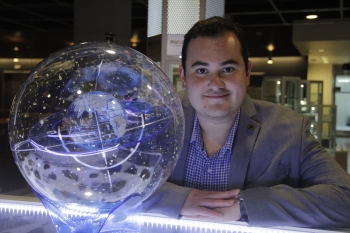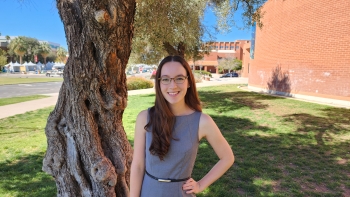The Heising-Simons Foundation has announced that Arizona State University School of Earth and Space Exploration postdoctoral researcher Luis Welbanks and incoming postdoctoral researcher Megan Weiner Mansfield, who will join ASU this fall, have each been selected for a 51 Pegasi b Fellowship in planetary astronomy. This fellowship provides exceptional postdoctoral scientists with the opportunity to conduct theoretical, observational and experimental research in planetary astronomy.
"I am 'over the moon' that Luis and Megan will be joining our exoplanet team as 51-Peg Fellows,” said Michael Line, associate professor in the School of Earth and Space Exploration (SESE). "They are both outstanding junior scientists in their field, and their decision to come to ASU is a testament to SESE's leading innovation in the exoplanetary sciences. It is an honor to serve as their mentor."
Established in 2017, the 51 Pegasi b Fellowship is named for the first exoplanet discovered orbiting a sun-like star. The growing field of planetary astronomy studies celestial objects both within and beyond our solar system, bridging planetary science and astronomy. From accelerating understanding of planetary system formation and evolution, to advancing new technologies for detecting Earth-like worlds, 51 Pegasi b Fellows make a unique contribution to the field.
“Arizona State University was selected just last year by the Heising-Simons Foundation as one of only 22 host institutions for the 51 Pegasi b Fellowship” said Meenakshi Wadhwa, director of SESE and Foundation and Regents Professor at ASU. “It is a true testament to the growing strength of our programs in planetary astronomy that two of the selected fellows this year have chosen to be hosted by us.”
Welbanks, a NASA Sagan Fellow at SESE, received his PhD in astronomy at the University of Cambridge Institute of Astronomy. His research focuses on the characterization of exoplanet atmospheres, from ultra-hot Jupiters to temperate Earth-sized planets, acquiring and interpreting low- and high-resolution atmospheric spectra of their atmospheres. He seeks to unravel the physical and chemical conditions for these planetary atmospheres as individual objects and populations.
“Right now, there are so many unknowns and so much potential," Welbanks said. "So many great people are working on collaborative, open-access science — setting the gold standard for the next decade and fueling a positive feedback loop.”
Incoming postdoctoral fellow Weiner Mansfield will join SESE this fall. Currently, Weiner Mansfield is a NASA Sagan Fellow at the University of Arizona, and her research focuses on the spectroscopic characterization of exoplanet atmospheres. She uses a variety of ground-based and space-based observations to study planetary formation, physics, chemistry and habitability. Weiner Mansfield received her PhD from the University of Chicago in 2021, where she performed spectroscopic observations and modeling of highly irradiated exoplanets, ranging in size from hot terrestrial planets to ultra-hot Jupiters.
“Spectroscopic eclipse mapping gives detailed information on what’s changing in both temperature and chemistry across points in a planet’s atmosphere," Weiner Mansfield said. "It’s a way to get at fundamental exoplanet parameters, like whether there is a magnetic field and, if so, how strong.”
During their fellowships, Welbanks and Weiner Mansfield's research will focus on investigations related to exoplanets. They will also receive mentorship by an established faculty member at the host institution and attend an annual summit to develop professional networks, exchange information and ideas, and foster collaboration
The fellowship will provide financial support for Welbanks and Mansfield to conduct independent research in planetary astronomy over the next three years.
More Science and technology

Cracking the code of online computer science clubs
Experts believe that involvement in college clubs and organizations increases student retention and helps learners build valuable social relationships. There are tons of such clubs on ASU's campuses…
Consortium for Science, Policy & Outcomes celebrates 25 years
For Arizona State University's Consortium for Science, Policy & Outcomes (CSPO), recognizing the past is just as important as designing the future. The consortium marked 25 years in Washington, D…

Hacking satellites to fix our oceans and shoot for the stars
By Preesha KumarFrom memory foam mattresses to the camera and GPS navigation on our phones, technology that was developed for space applications enhances our everyday lives on Earth. In fact, Chris…

